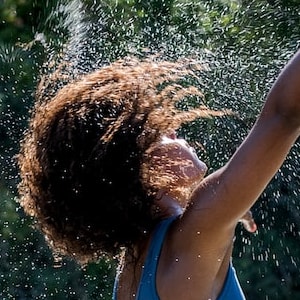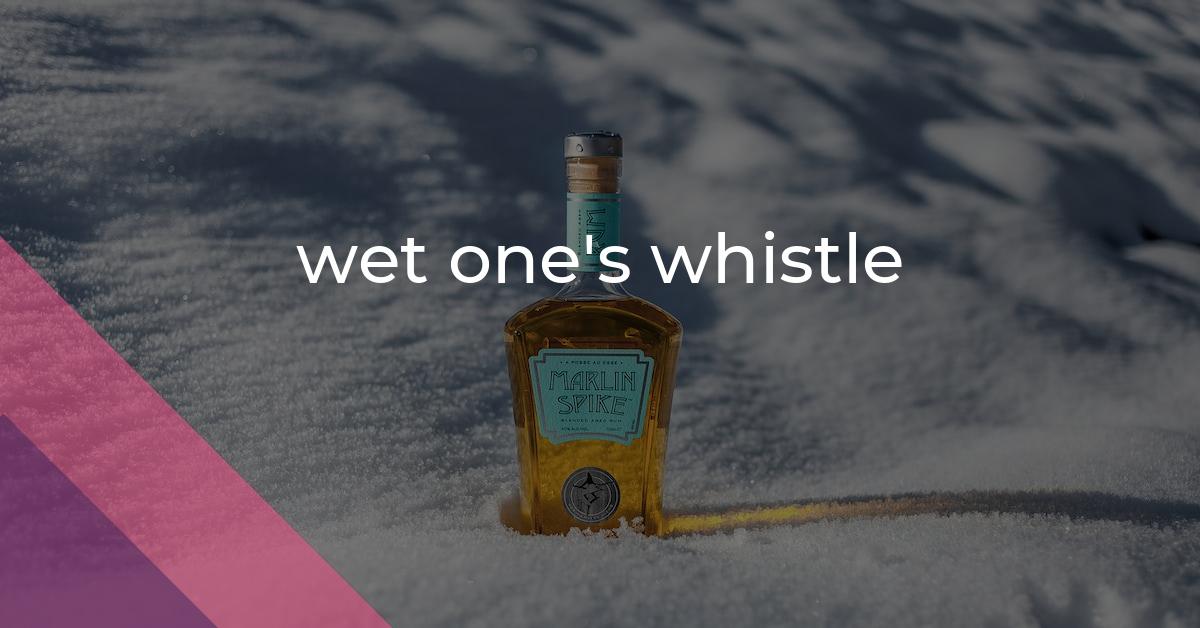wet one’s whistle: Idiom Meaning and Origin
What does ‘wet one's whistle’ mean?
wet one's whistle: to have a drink, usually an alcoholic one, in order to quench one's thirst or refresh oneself.

Idiom Explorer
The idiom "zip one's lip" means to keep quiet or stop talking, often to avoid revealing a secret or to prevent oneself from saying something inappropriate or unnecessary.
The idiom "wet the bed" means to fail or make a serious mistake, particularly when under pressure or in a high-stakes situation.
The idiom "wet one's pants" means to involuntarily urinate due to extreme fear, excitement, or laughter. This phrase is often used figuratively to describe someone who is extremely scared, excited, or amused.
The idiom "wet one's beak" means to receive a share of profits or benefits, especially in a dishonest or unethical manner.
The idiom "wet behind the ears" means someone who is young or inexperienced.
The idiom "water to one's mill" means something that is helpful or advantageous to a person or their interests, often used in the context of providing support or benefit. The phrase comes from the idea that water is necessary to power a mill, and without it, the mill would not be able to function effectively.
The idiom "watering hole" refers to a place, often a bar or pub, where people gather to socialize and have drinks. It symbolizes a meeting point or social hub where individuals come together to relax and enjoy each other's company.
The idiom "water down" means to dilute or weaken something, making it less potent or effective.
The idiom "wash one's hands" means to distance oneself from responsibility or guilt, often by refusing to be involved or implicated in a particular situation.
The idiom "wag a finger" means to scold or reprimand someone. It is often used to convey disapproval or admonishment for someone's behavior or actions.
Quenching Whistle
The idiom "wet one's whistle" is commonly used in English-speaking countries, particularly in the United States, to mean having a drink, typically an alcoholic one, to quench one's thirst or refresh oneself. The exact origin of the phrase is uncertain, but it is believed to have come from the practice of wetting the lips or throat before playing a wind instrument or engaging in strenuous physical activity.
This idiom has been in use for centuries and has appeared in various forms throughout history. In fact, one of the earliest recorded instances of the phrase can be found in Shakespeare's play Henry IV, Part 1. In this play, the character Falstaff says, "I will drink thy tears, mistaking them for pearls, and drink indeed to wet my whistles." This suggests that the idiom was already well-established and understood during Shakespeare's time.
Over time, the phrase has evolved to primarily refer to the act of consuming a beverage to quench one's thirst. The word "whistle" in the idiom metaphorically represents the throat or the mouth, while "wet" signifies the act of moistening or lubricating. When combined, the phrase conveys the idea of satisfying or indulging in a refreshing drink. The use of the word "whistle" adds a playful element to the expression.
Although the idiom is often associated with drinking alcohol, it can also be used in a broader sense to refer to any kind of beverage. It is commonly used in social or informal settings where people gather to socialize and enjoy drinks together. Whether it's a cold glass of water on a hot summer day or a pint of beer at a local pub, wetting one's whistle can signify a desire to quench one's thirst or simply to join others in the act of consuming a beverage.
Despite the uncertainty surrounding its origins and etymology, "wet one's whistle" has become deeply ingrained in the English language and continues to be used in everyday conversation. Its catchy and memorable quality has made it a popular choice for writers, speakers, and advertisers looking to convey the idea of refreshment or indulgence. The idiom's ambiguity allows individuals to create their own associations and meanings, adding to its charm and versatility.
Now, let's explore how the idiom "wet one's whistle" is related to other idioms:
The idiom "wet one's beak" is similar to "wet one's whistle" in that it also involves the act of drinking or consuming a beverage. However, "wet one's beak" is often used in a figurative sense to refer to taking a share or portion of something, especially when it comes to getting a taste of profits or benefits. The phrase "wet one's beak" is commonly associated with the world of organized crime and is believed to have originated from the practice of birds dipping their beaks into water to drink.
Another related idiom is "wet one's pants," although it has a different meaning altogether. While "wet one's whistle" refers to drinking, "wet one's pants" refers to a humorous or exaggerated expression of excitement, fear, or laughter. It is often used to convey someone's extreme reaction to a situation, exaggerating their level of enthusiasm or surprise. The phrase "wet one's pants" can be traced back to the idea that a sudden burst of laughter or surprise could cause one to lose control of their bladder momentarily.
Lastly, the idiom "dry out" is somewhat opposite to "wet one's whistle." While "wet one's whistle" involves the act of satisfying one's thirst or indulging in a beverage, "dry out" refers to the process of abstaining from alcohol or any other intoxicating substance. It is often used in the context of recovering from addiction or addressing problematic drinking habits. When someone decides to "dry out," they are taking a break from consuming alcohol to focus on their physical and mental well-being.
"wet one's whistle" is a widely used idiom that means to have a drink to quench one's thirst or refresh oneself. Its origin is uncertain, but it has been in use for centuries and has even appeared in Shakespeare's plays. The phrase has evolved to primarily refer to the act of consuming a beverage, often alcohol, but can also be used in a broader sense. It has become deeply ingrained in the English language and continues to be used in everyday conversation. The idiom's playful and ambiguous nature adds to its appeal, allowing individuals to create their own associations and meanings.
Example usage
Examples:
- After a long day of work, John went to the bar to wet his whistle with a cold beer.
- The coach's halftime speech was interrupted when the players took a break to wet their whistles with water.
- Before starting his presentation, the speaker took a sip of water to wet his whistle and clear his throat.
More "Drinks" idioms



